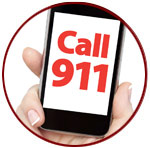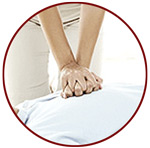Heart Disease
Many North Carolinians are affected by some form of heart disease personally or through someone they know. In fact, it is the second leading cause of death in the state. Heart disease is a term that describes many different conditions that affect the heart and cardiovascular system.
It is important to know the different types of heart disease and the ways to keep your heart healthy. Heart disease is a term that describes several different heart conditions. Heart disease can cause heart attacks, stroke, heart failure and an irregular heart beat.
Heart Attack Warning Signs
Knowing the warning signs of a heart attack could save your life!
- Chest discomfort in men involves discomfort in the center of the chest that lasts more than a few minutes. This discomfort may also go away and come back. It can feel like uncomfortable pressure, squeezing, fullness or pain.
- Upper body discomfort can include pain or discomfort in one or both arms, the back, neck, jaw or stomach.
- Shortness of breath is often accompanied by chest discomfort, but it can occur before the chest discomfort.
- Other signs may include a cold sweat, nausea or lightheadedness.
- Women may have different signs and symptoms. Women are less likely than men to experience chest pain. Instead, women may feel a persistent pain in the back, neck, jaw, or even shoulder blades. Before or during a heart attack, women are also more likely to experience fatigue, sweating, nausea and indigestion.

Call 911 if you suspect that you or someone else is having a heart attack.
If you are certified in CPR, you can help start someone’s heart if the person stops breathing or is suffering a heart attack. The local American Heart Association, American Red Cross, some EMS locations and other local organizations offer classes to train and certify in this life-saving technique.

Start Cardiopulmonary Resuscitation (CPR)
If you or someone you are with has chest discomfort – especially with one or more of the heart attack warning signs – call 911 right away.

Automatic External Defibrillator (AED)
If you are in a public place, seek out an Automatic External Defibrillator (AED). Many malls, restaurants, hotels, schools and offices have these life-saving machines. If an AED is available, turn it on and follow the simple directions on the machine.

